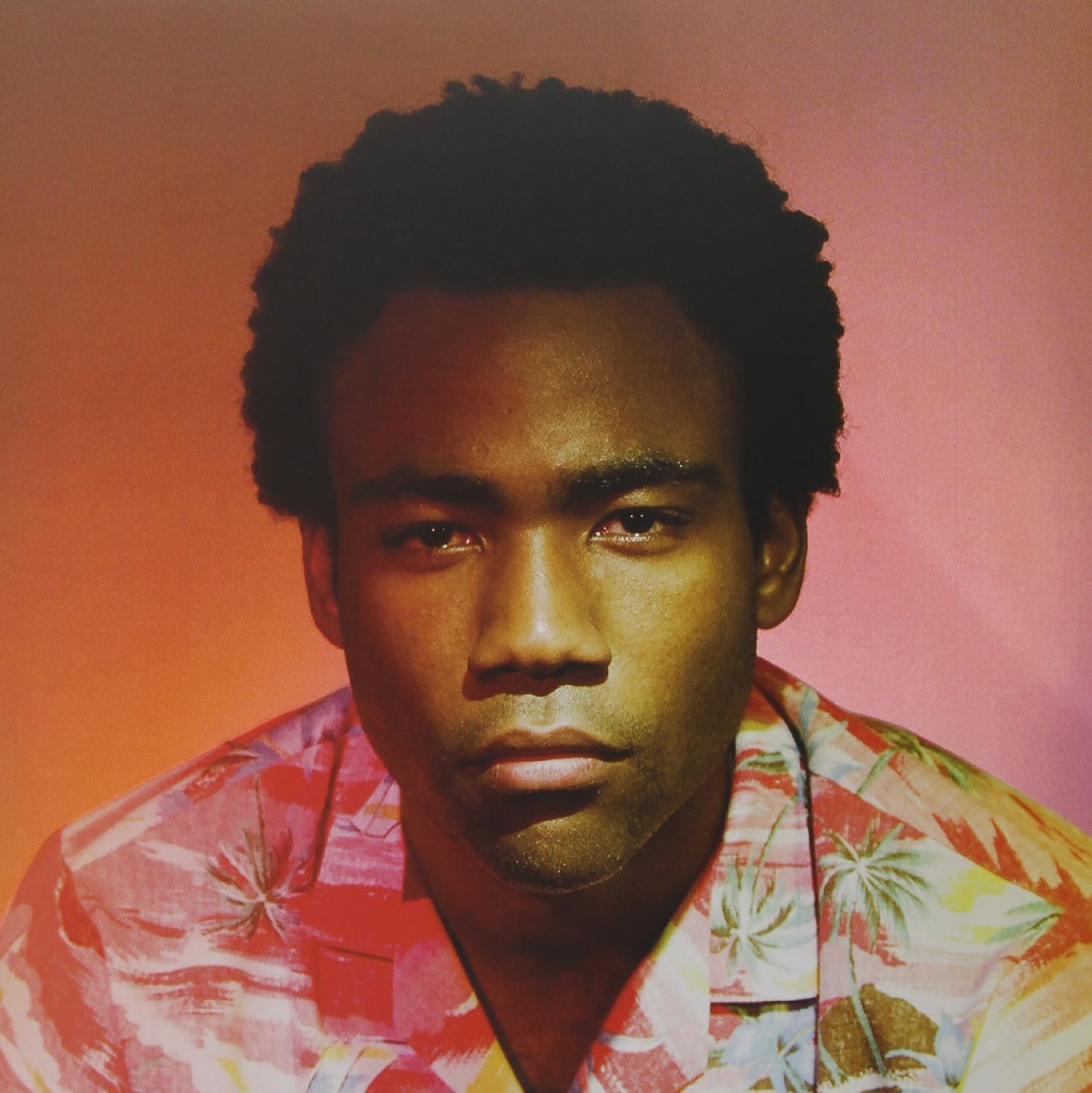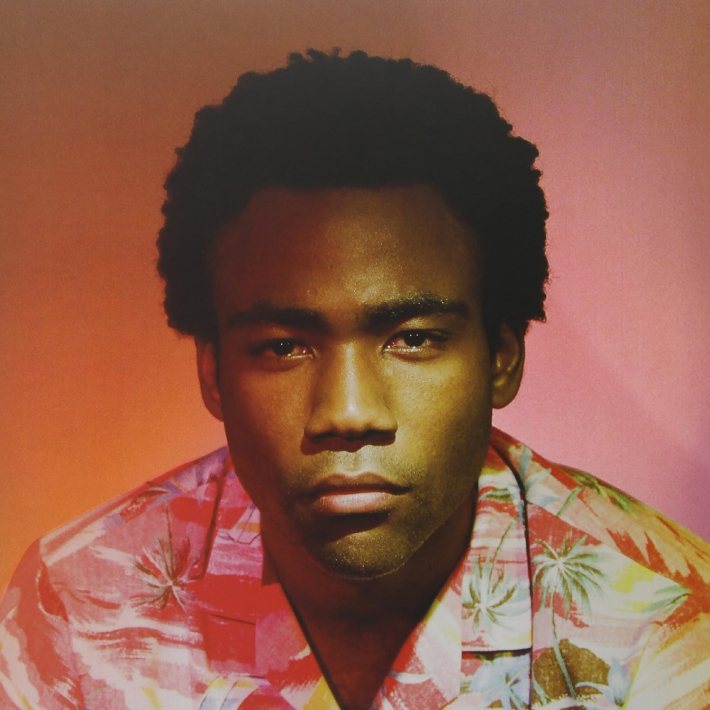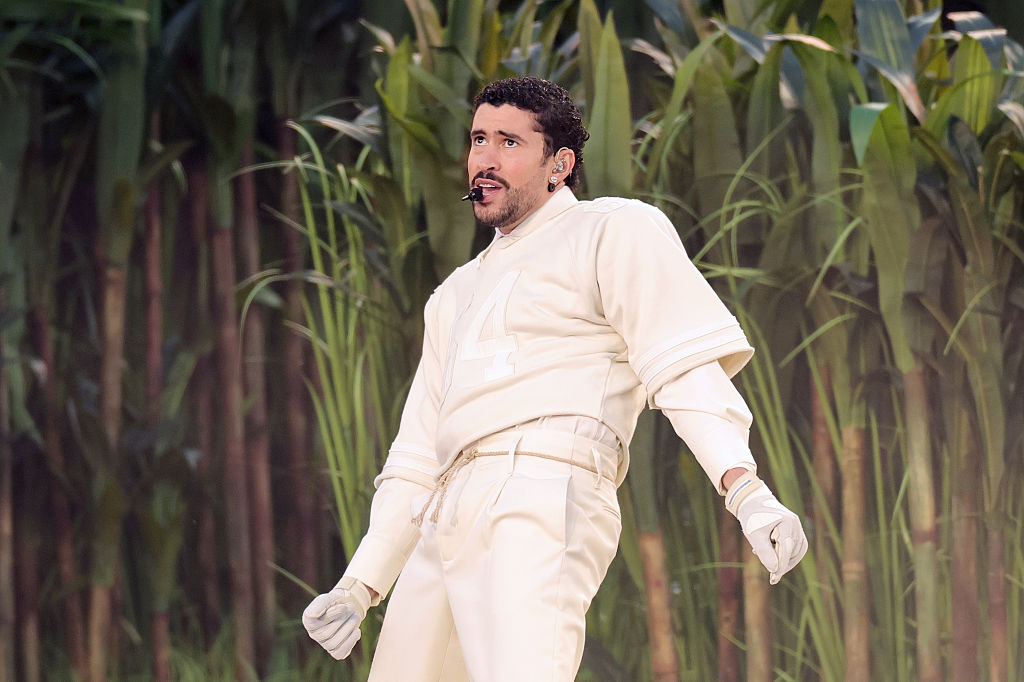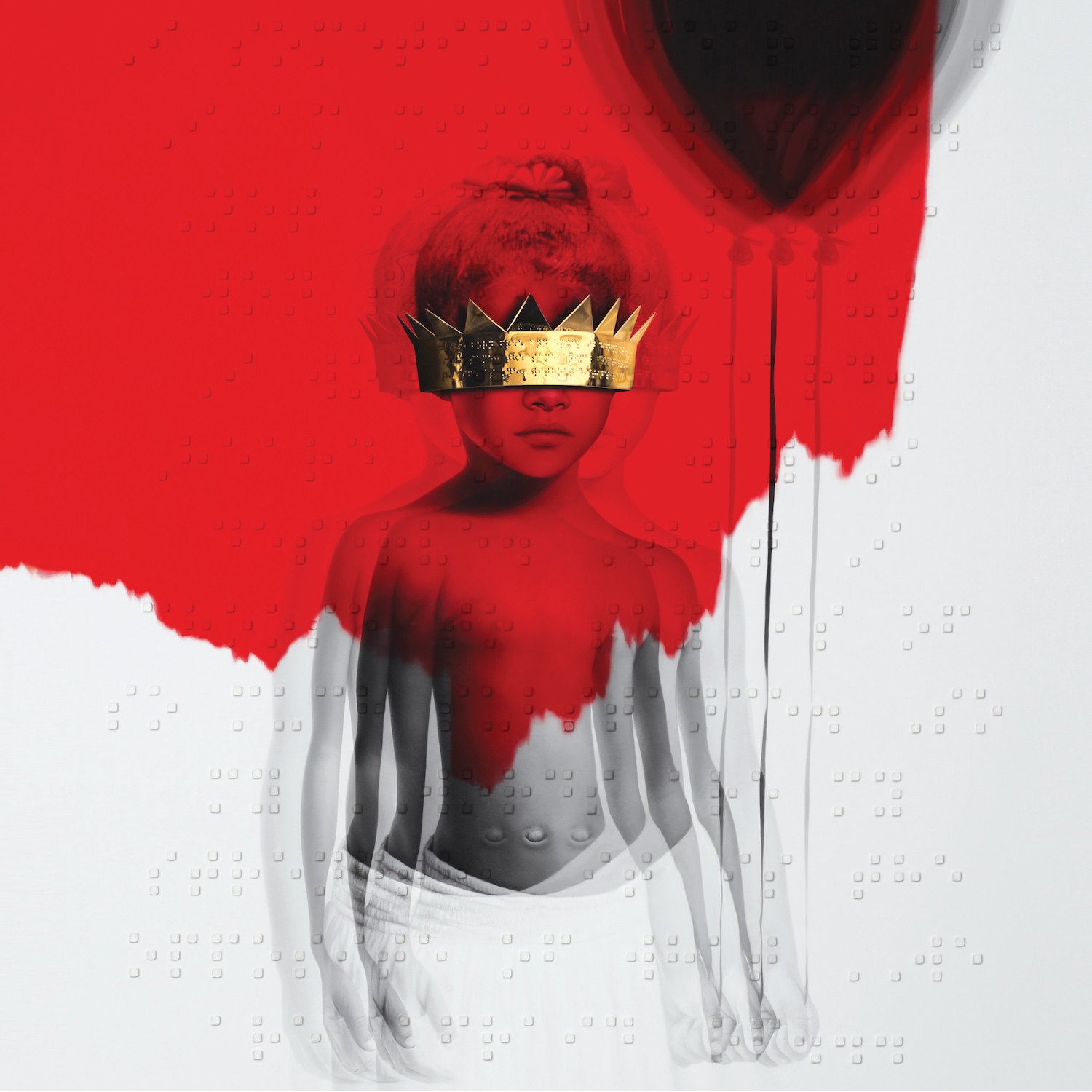- Glassnote
- 2013
Allow me to reintroduce Because The Internet. Released 10 years ago this Sunday, Childish Gambino's sophomore "album" is a haphazard screenplay (no longer included with the project but preserved on Tumblr), a 25-minute film prelude titled "Clapping For The Wrong Reasons," since taken-down reference scenes, and a soundtrack divided into seven chapters, all starring Donald Glover as the Boy. The bloodshot photography is done by Autumn de Wilde, the veteran portrait artist and music video director who went on to direct her first feature film, Emma, in 2020. Ludwig Göransson, who produced 16 of the project's 19 tracks, went from composing for Community to winning an Oscar for his Black Panther score. (You most recently heard his work in Oppenheimer.)
The screenplay follows the Boy as he grapples with ego death, digital blackface, hallucinations, borderline racist threesomes, the faceless famous, and a host of unrelated scenes exclusively dedicated to developing overarching allegories. The Boy is a nameless protagonist, made to connect with those who feel disenfranchised by the physical world and have moved on to trolling through cyberspace. It’s a fitting subject for a creative who became one of the biggest stars in music but often on his own wave, ostracized from his peer group.
The screenplay, album, and film are paradoxical — often glaringly clear-cut, just as often strategically misrepresented. Typos make the screenplay feel as if it was written on iMessage, be it misusing plural possessives, writing out "[no face emoji]" or jotting "smh" whenever a character should scoff or shake their head. Glover comments on Page 4, "(smh at the 'your’)," as the Boy judges another character's grammar. As for the recording sessions, Gambino told MTV that there were "strict house rules, which included 'no tweeting or Instagramming,' 'no shoes,' and 'work begins at 10 a.m.'"
Critics did not take kindly to Childish Gambino, which made Because The Internet instantly polarizing. 2011's Camp, an album about growing up an outcast in his community, turned Gambino into only more of an outcast. On "Hold You Down," Glover raps over bright piano chords and simple drums: "N****s got the feeling that I'm not Black enough to go to church, culture shock at barber shops cause I ain't hood enough/ We all look the same to the cops, ain't that good enough?" Pitchfork’s notorious pan concluded that Camp was “preposterously self-obsessed, but not the least bit self-aware,” which made those who’d forged a connection with it even more passionate about their support.
The dynamic was unchanged less than two months before Because The Internet came out, when Donald Glover performed at the first Life Is Beautiful festival in Las Vegas. As Childish Gambino, he began his set by announcing, "I wasn't even sure if I was going to do this show because the cops were fucking with us before, but that's really not fair to you guys and I really am excited for the show because we've got a lot of new songs," before going into an opener as rapturous as the THX logo: "I. Crawl." On the song, which also opens the album, live electric guitars ignite Mystikal's panning voice alongside quaking half-time bass kicks. A synthesized choir bellows against the static and white noise, preparing listeners to embark on an expedition surfing through the digital landscape.
Because The Internet ushered in a new wave of Afrofuturism into pop culture, predating Jordan Peele’s Get Out, Boots Riley’s Sorry To Bother You, and Ryan Coogler’s Black Panther by over three years. Discreetly planting the seeds for Atlanta, the Boy explores the same surreal world that Earn would eventually be placed in. He goes from taping a fight for Worldstar to having a murder recorded on his phone, he witnesses an incident of police brutality at an In-N-Out in the middle of nowhere, and reality turns to fantasy when he starts seeing spiders fall from his bed posts. One of the last lines of "Clapping For The Wrong Reasons" even delivers the thesis of Glover's upcoming work in a single sentence, held in the air by two-and-a-half minutes of silence: "Sometimes you just can't explain things."
Because The Internet abandons the structure of a traditional LP and sequences the tracklist to soundtrack his written word. The result is an album that feels complete, even though it's not quite. "II. Worldstar" follows scattered, syncopated clicks as dodging footsteps and taunts from a fight video play in the background. The bass is near-overwhelming, reverberating just long enough to fill in the silence as Gambino raps in staccato syllables. Every time I record a video on my phone, I can't help but recollect Gambino switching his tone to overtly serious halfway through the song. Right before the beat morphs into an entire crowd chanting "Worldstar," Childish Gambino spares no detail to his artistic process: "You've got to hold it horizontal man, be professional."
The song flips into a saxophone jazz solo, before introducing the warm crackle of "I. The Worst Guys'" synthesizers on "Dial Up." Glover and Göransson distort reality on "II. Shadows," using a reversed drum pattern and a slick-fingered Thundercat baseline to mimic the fleeting nature of young love, its excitement and its ability to fall apart at any given moment. In a world where anything is possible, the Boy leads his girlfriend into a closet that transports them to Coachella instead of Narnia, even noting in the lyrics: “We popped pills at the Coachella/ Hold my head in the weeds, man, I can’t tell her/ The fear that I feel, man, it might kill her,” before the song begins cutting in and out, distorting more and more until the beat is suddenly overhauled by an electric guitar’s power chords driving through Glover’s falsetto as the fantasy begins to fall apart.
Playing out like seasons, a nonchalant playfulness comes out in the summertime, leaving"III. Telegraph Ave. ("Oakland" by Lloyd)," "IV. Sweatpants," "3005," and "Secret Track 9 1/2" as regional tributes to different areas of California, from Compton to the Palisades. “Oakland” is laidback, and a cassette is pushed in for the daily commute, "IV. Sweatpants" is witty and casually braggadocious with assistance from JasonMartin. "3005" and the unofficially titled "3005 (Beach Picnic Remix)" take a drive down from the Valley to the Santa Monica pier to watch the sunset. At least that's what's pictured in the music video — the script describes a scene of three-feet-high creatures marching, forming a circle, clapping, then stopping. Sometimes you just can't explain things.
"I. The Party" and "II. No Exit" feature two of Childish Gambino's best verses on the album, rapping in grumbled 16th notes, agitated as he describes the mansion depicted in both the screenplay and "Clapping For The Wrong Reasons." The tracks immediately create tension with the muted swing of Gambino singing before his voice layers to a ghoulish shriek. Glover's attention to detail comes out here as he tries to match the frustration of the Boy in his intonation. Everything falls apart for the Boy, who's beginning to obsess over the mysterious phrase popping up everywhere: "Roscoe's Wetsuit."
The next act follows the Boy grieving the death of his father (played in the script by Rick Ross). Childish Gambino delivers the dark electronic descent of "Death By Numbers" and the loop of acoustic guitar strums on "I. Flight Of The Navigator," with Gambino issuing a spoken word eulogy for lost love. "II. Zealots Of Stockholm [Free Information]" captures death through as if it's akin to shutting down a computer, deconstructing club music, stripping it down to uneven synths, a bass so distorted it's blowing raspberries, and a deathly whisper promising "free information" before "III. Urn," a final neo-soul palpitation beating with a loving goodbye for Rick Ross.
"I. Pink Toes" with Jhene Aikó begins the album's concluding chapters, once again reflecting on budding love, with Glover noting: "Anything we put here wouldn't do justice to what actually happens when a person you meet ends up in your life out of nowhere." Birds chirp in the song's background, electronic piano keys whirl, and romance is in the air until the Boy runs into trouble one last time, right after he finishes listening to "Danny Glover" by Young Thug on I-10.
Because The Internet is simultaneously ahead of its time, of its time, and timeless because… the internet. Some of its pop culture references feel prescient a decade later. Gambino even hops on a Jersey club beat with Azaelia Banks, almost a decade before Cash Cobain and Evilgiane began dousing Drake and Kendrick Lamar's beats with misaligned kicks. After spending so much time away from the album and its dense 72-page screenplay, in an era when you can listen to an album once and never even see the cover art again, Because The Internet has lasted so long because of the sheer number of hours that was put into its creation. It mostly holds up, though I still always lift the needle when I hear "III. Life The Biggest Troll [Andrew Auernheimer]." No one needs to ruin a perfect album with a reminder of the corny one-liners that tarnished Camp.
A lot has changed in the last 10 years, but the ambition inherent in so many of Glover’s projects was already there a decade ago. Whether he's starting a creative agency on his farm in Ojai or starting a boba shop in Silverlake, Donald Glover is meticulous, and the oversight necessary to shepherd such a fully-realized multimedia project is baffling. When Before The Internet came out, Atlanta, Glover's ticket to critical prestige, had just been picked up by FX; the pilot wouldn't air for another three years. "Awaken, My Love!" and "This Is America," the album and hit single/viral music video that won Glover a bit more critical respect on the musical side, were also still years off. But you can hear the same mind that yielded "Redbone" and "Teddy Perkins" at work on Because The Internet.
We rely on reader subscriptions to deliver articles like the one you're reading. Become a member and help support independent media!







